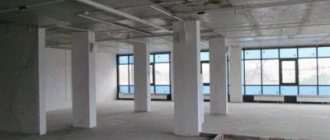Definition of the concept
The legislation of the Russian Federation does not have a clear definition of a non-residential property. However, there are a number of signs according to which such real estate can be identified.
The characteristics of non-residential premises are given in the Civil and Housing Codes of the Russian Federation (including Federal Law No. 122 as amended on April 6, 2015).
Signs of a non-residential property:
- Has the following functional characteristics:
- not intended for residential use;
- used for industrial and public purposes;
- Belonging to real estate.
- It is an integral part of the building (this distinctive feature delimits non-residential premises and structures, and at the same time indicates their spatial relationship).
- Isolation: just like housing, non-residential premises must be isolated; materiality: the presence of certain boundaries.
- Relationship with the land plot: real estate is registered at a specific address.
- Classified as a non-residential property, it can be located in both a residential and non-residential building.
Read more about the differences between residential and non-residential premises here.
Non-residential house
1) garden plot of land - a plot of land intended for recreation of citizens and (or) cultivation of agricultural crops by citizens for their own needs with the right to place garden houses, residential buildings, outbuildings and garages;
InfoIn the event that a gardening partnership is located on agricultural lands, the fact that the building is suitable for permanent residence does not remove restrictions on registration (registration) at the place of residence.
Intended use of real estate not intended for residential use
Information about the purpose of the premises is entered into the database at the time of cadastral registration (according to clause 16, chapter 2 of Law 221-FZ of July 24, 2007). Non-residential premises have their own purpose - the type of activity for which this object is intended. The purposes of using non-residential premises are distinguished as follows:
- office;
- trading;
- sports;
- municipal and household;
- educational;
- medical;
- production;
- catering establishments;
- warehouse;
- free appointment, etc.
Real estate objects not intended for residential use are subject to another classification - by functional purpose. For this purpose, technical characteristics and design features are taken into account. In this aspect, the premises are:
- technical;
- auxiliary;
- communication;
- basic;
- serving.
A garden house is a residential or non-residential premises
Order a lawyer's consultation Legal topics: Family. Marriage. Children Rights, freedoms and responsibilities of man and citizen Administrative responsibility and offenses Biography: Faculty of Law of the Sakha Academy of Sciences, specialization in the field of civil law and procedure. The experience of a specialist in any industry is determined not by the amount of time worked in the specialty, but by the amount of accumulated knowledge.
In the decision-making process, authorized bodies may require additional documents not included in this list. Upon acceptance, the owner of the property receives a receipt stating that the package of documents has been submitted and is awaiting the decision of the commission.
Basic division of objects
The concept of purpose of non-residential premises is not legally defined . According to the order of the Ministry of Economic Development of the Russian Federation No. 943 dated December 16, 2015. The procedure for maintaining the Unified State Register was approved. Block 3.5, clause 36, subclause 3 of the document states that, according to their purpose, premises are divided into residential and non-residential.
Moreover, the first ones are intended exclusively for one purpose - residence of citizens. The latter are classified according to their intended purpose in accordance with the type of permitted use in the Unified State Register of Real Estate.
Important : a clear definition of the intended purpose may limit the options for using a non-residential property. This may be due to different standards of sanitary, fire safety and other requirements.
The procedure for converting a non-residential building in SNT into residential
If the house has undergone redevelopment, you will need to submit design documentation. The person making the appeal will have to write a statement containing the purpose. In particular, you can indicate that you need to transfer your country house to the category of residential premises for the reason that you want to live in it on a permanent basis and are registering there. It must be permanent. You will also need to copy the document that verifies your identity. A receipt indicating payment of the state duty may also be added to these papers.
We recommend reading: Joint Stock Company Moscow Real Estate address
It is possible to convert a dacha into residential premises if certain conditions are met. They relate to land plots and country houses. In particular, the requirements for a land plot are related to the category to which the plot belongs. It is imperative that these are lands related to populated areas. If the non-residential premises are located on a site that is classified as agricultural land, then before converting the dacha into a residential building, you will need to transfer the land from one category to another. The land in gardening partnerships must be located in the zone where buildings with residential purposes are being erected. Please note that only a few uses are permitted, these include:
Responsibility for improper use
Use of non-residential premises for other purposes entails administrative liability . In order to avoid disputes and litigation, it is necessary to harmonize the documentary and actual purposes of real estate.
Another significant point is that non-residential premises are not intended for living. In the Housing Code of the Russian Federation in Art. 15 contains comprehensive requirements for residential premises. If at least one condition is not met, you cannot live in the building or part of it.
The legislation of the Russian Federation does not include direct liability for living in non-residential premises , but there is liability for violation of sanitary and epidemiological standards (in terms of area, noise level, layout, lighting, etc.).
The punishment for such an offense is a fine in the amount of 500 to 1000 rubles. for citizens, from 1000 to 2000 rubles. for officials, in the same amount for individual entrepreneurs (or suspension of activities for a period of up to 90 days), from 10,000 to 20,000 rubles. or suspension of activities for up to 3 months for legal entities.
You will find more information about the rules for using non-residential premises in this article.
Register a country house as residential or non-residential
In the event that a gardening partnership is located on agricultural land, the fact that the building is suitable for permanent residence does not remove restrictions on registration (registration) at the place of residence. The Constitutional Court of the Russian Federation indicated that since housing legislation is the sphere of joint jurisdiction of the Russian Federation and the constituent entities of the Russian Federation (clause
A residential building is distinguished by its purpose, the possibility of recognizing the object as suitable for permanent residence. Also important is the permitted use of the land plot - for individual housing construction.
Classification of areas and their characteristics
Free - what is it?
In order to expand the possible areas of use of real estate, you can give it the status of non-residential premises for free use. Such facilities are operated by owners and tenants in various areas of activity, with the exception of specialized ones.
Important : non-residential premises for free use have wide functionality.
The intended purpose of the property often becomes known at the time of design, but for the owner the best option is to create a universal structure . Such a building can be repurposed at the request of the tenant. Often non-residential premises for free purposes are used as shopping centers, offices, household or social enterprises.
Free-use premises, despite their multifunctionality, cannot be fully suitable for all areas of activity. Given the specifics of the institution’s work, in some cases additional documentary approvals will be required.
Residential
According to Law No. 218-FZ, Article 8, Part 5, Clauses 9, 10, 11, the Unified State Register includes additional information about the purpose of the building, premises, and its name. When registering for cadastral registration, only basic information about the property changes; regarding changes in purpose, you should be guided by the Housing Code of the Russian Federation (Chapter 4). It is important that changing the purpose of a room in a building does not entail a change in the building itself (for example, a residential premises, a non-residential building).
In this regard, authorized state bodies send information about changing the purpose of non-residential premises to the Unified State Register of Real Estate for inclusion of such information in the register (Law No. 218-FZ, Article 32, Part 1).
Law 221-FZ of July 24, 2007 “On the State Real Estate Cadastre” includes information about the type of real estate (non-residential or residential building), as well as its purpose (residential, non-residential premises). This information is also recorded in the certificate of state registration of ownership.
Read more about the classification of non-residential premises here.
What is the best way to register a garden house as a residential or non-residential building?
To determine whether a country house is a residential or non-residential premises, you need to study documents on the purpose of the land - for settlements or agricultural land. Care will help you avoid problems with registration, because people often want to buy an inexpensive country house in the Moscow region just for registration.
Mozhaisk region? eshka_406 10.26.2021, 10:07 # Dolginino BALTIETS 10.26.2021, 10:43 # and we are thinking of building in Antonovo






